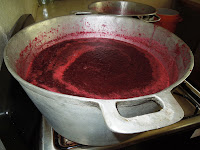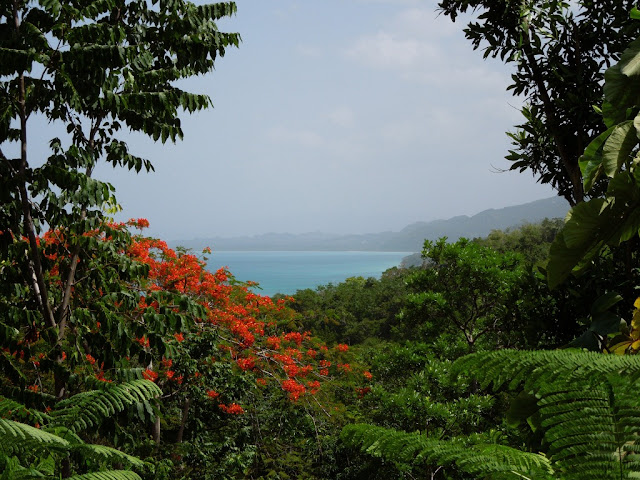November 2 will go down as the day I came down with Dengue
Fever, a mosquito-borne virus that manifested itself in the following symptoms
in no particular order of appearance: high fever, body ache, chronic low fever,
upset stomach, diarrhea, rash, headache, pain behind eyes, fatigue, cold sweat,
painful sensitivity on palms and soles of feet, dehydration, weight loss,
nausea, and probably more…memory loss perhaps (that last one is a joke). I was
in bed for about six days and am only now spending the whole day “up”. This
ordeal has given me a lot of time “in my head” and one of the latest thoughts
that got me thinking was, “How did I get here?” If I were to ask my 18 year old
self there is no way I could have concocted the string of events that have
unfolded over the last ten years of this unanticipated life that led to lying
in Jamaica with a nasty illness.
 |
| Ohio farm where I was raised |
I was going to raise pigs. That was my plan at one point. I
was a true, blue 4-H and FFA kid who lived for the county fair. For example, my
job shadowing experience in high school was at a large wean-to-finish hog barn
in Knox County, Ohio. OK, swine farming was probably never going to be my
primary occupation, but I definitely had a love for raising show quality pigs;
Durocs specifically. The career I settled on out of high school was to be an
agricultural science teacher at the high school level and I started as a
freshman at the Agricultural and Technical Institute (ATI) branch of The Ohio
State University. ATI was perfect: it was located in my hometown and was
basically like an extra year of high school with nothing but farmers as
classmates. ATI was affectionately referred to as the Alcohol and Tobacco
Institute by students, probably because of all the farmhouse parties and so
many Skoal rings in the back pocket of Wrangler jeans. My plan was to save
money by starting at this branch before transferring down to main campus. Yup,
I was living in hillbilly heaven and I was on my way.
 |
| Baquba, Iraq (probably 2004) |
Or, so I thought. As the saying goes, “if you want to hear
God laugh, tell him your plans.” At the end of 2002 and early 2003, George W.
Bush was making a pretty darn good case for regime change in Iraq and just days
after “shock and awe” commenced, I was proudly enlisted in the Army Reserve.
So, after my first year of classes and bad grades, I completed the Army’s
initial entry training and within a year I was off to Iraq, 20 years old and
green.
There is an aptly named book called Fiasco about the first few years of the war. I would sum up the
experiences of my first deployment as a bunch of military men and women doing
what they could to make the best of a bad situation made worse by an
administration that had no clear strategic vision or plan. This made coming
home to the college setting…interesting. I wouldn’t call it PTSD, but I was
definitely 21 and bitter, though fortunately a little more serious about my
grades.
I was blessed to be able to start back to school at main
campus by living with my best friend’s brother who was also a good friend. He
was a couple years older and grounded, so I think that helped. However, after
about a year, it became clear that I wasn’t cut out for high school teaching,
so I changed majors to Animal Science with the intent of going into Extension
education. That might have worked out, but in 2007 I met my future wife and also found out I had to go back to Iraq.
By January 2008 I was back in the Sunni triangle. The sequel
to the aforementioned Fiasco is
called The Gamble, which is about the
surge and change in tactics that paid off so well. Current scandal
notwithstanding, I feel I owe a great debt of gratitude to Gen. David Petraeus
and guys like Amb. Ryan Crocker and Sec. Robert Gates for the much more
purposeful experience I had the second go-round.
 |
| Bayji, Iraq (2008) |
Iraq 2008 was where my career interests really started to
shift. In addition to trying to keep al Qaeda out of Bayji, I had the privilege
of working with civilian representatives from USDA and USAID (one of which sung
the praises of his Peace Corps experience and how it helped him get his career
going). I had heard about development
work from Linnae, but this was the first time I saw it in action and
appreciated the impact agricultural and economic development can have on peace
and pacifying combatants. This was also the first time I had heard about Team
Borlaug from Texas A&M University; a group of professors and specialists
touring the country to do agriculture assessments. Significant acts (SIGACTS) of violence in
our area of operations fell 80% while I was in country that year and I knew it
wasn’t just because we had bigger guns and mine-resistant armor protected
vehicles. Late that November I was back on American soil a newly minted Staff
Sergeant with a new perspective.
I’ll never forget the day on campus when I stepped into the
coffee shop, embittered by the stress of another deployment, while some girl
who had gone well beyond adding a “freshmen fifteen” pounds was bopping away in
her stretchpants to some music on her MP3 player. Just knowing what a different
world existed between those earphones was unforgettable. But I digress. Linnae
was working in Washington, DC and I was struggling through chemistry, biology,
and physics and applying to a competitive summer internship program in DC.
Fortunately, I made it into the program on my military laurels because my GPA
was only then breaking above the 2.5 mark. After six months of us commuting on
weekends, I was finally in DC with Linnae for an internship at the Foreign
Agricultural Service at the USDA. This is where I learned much more about the
possibilities for work in international agricultural development. I also
learned more about that faraway school I mentioned earlier, the one that had
been doing the work in Iraq while I was there.
 |
| Wedding Day: Hippie marries Soldier ;) |
That fall of 2009, Linnae and I got married and she started
grad school in Development Economics at Ohio State while I completed my senior year. I spent my last two
years of school firmly planted on the Dean’s List, which paid off with
admission to a Master’s program at Texas A&M (TAMU) the autumn after
graduation. I took a few online Master’s classes that fall and we both
submitted applications to the Peace Corps. On December 30th we were
two Buckeyes and a dog U-Hauling it to College Station, Texas for my year of
coursework as an Aggie. There are probably few campuses in America where a
veteran feels as at ease as at TAMU. I really enjoyed my time there and
volunteered often with the Norman Borlaug Institute for International
Agriculture, even getting the opportunity to train some National Guard
agriculture specialists before they deployed to Afghanistan. I helped train
those Soldiers just a few months after my Army enlistment contract expired, so
it was extra meaningful at the time.
 |
| Bor, South Sudan |
 |
| Conversation with smallholders in South Sudan |
Linnae and I were starting to get nervous as 2011 wore on
and we weren’t getting an official Peace Corps invitation to serve. I was going
to run out of courses and had no plans for doing my thesis research other than
in Peace Corps. That is when I got a call from the director of the Borlaug
Institute; the organization responsible for the Team Borlaug I had learned of
three years prior in Iraq. The Borlaug Institute had just won an unsolicited
bid for a USAID project in South Sudan and wanted me for a short-term gig as
the project got started. What’s that you say? Post-conflict agricultural
development and a bridge of employment before Peace Corps? Done! It was about a
week later Linnae and I were pleasantly surprised with an invitation to serve
in Jamaica. So, with a future more or less certain, for three months I worked
the project in South Sudan and learned a lot about how projects in such
environments evolve into order. I came home from Africa in mid-February, helped
pack up the truck to move our things back to Ohio and we were in Jamaica by
mid-March.
 |
| Wash time in Westmoreland, Jamaica |
So, in a nutshell, I guess that is how I got “here” to the
middle of the Caribbean with a tropical illness and a world completely
different from anything I have ever known. The hardest things is not knowing if
my life will be able to follow a path back to the things I loved before this
string of events began to unfold. Will I again get to live a significant
portion of my life in the quietude of rural life? Will I be able to give my
children the opportunity to participate in 4-H and FFA or exhibit something at
the county fair? How will I connect to our children if I must raise them in a
place drastically different from what I was raised in? Some people look at
rural Americans as backward or xenophobic, but I know differently. There is
something special about life outside the rat race. Whatever that something
special is may not be objectively better than where you come from, but from my
subjective perspective it is and getting more of it back in my life has been on
my mind.
 |
| Just listening to a man about his goats |














































